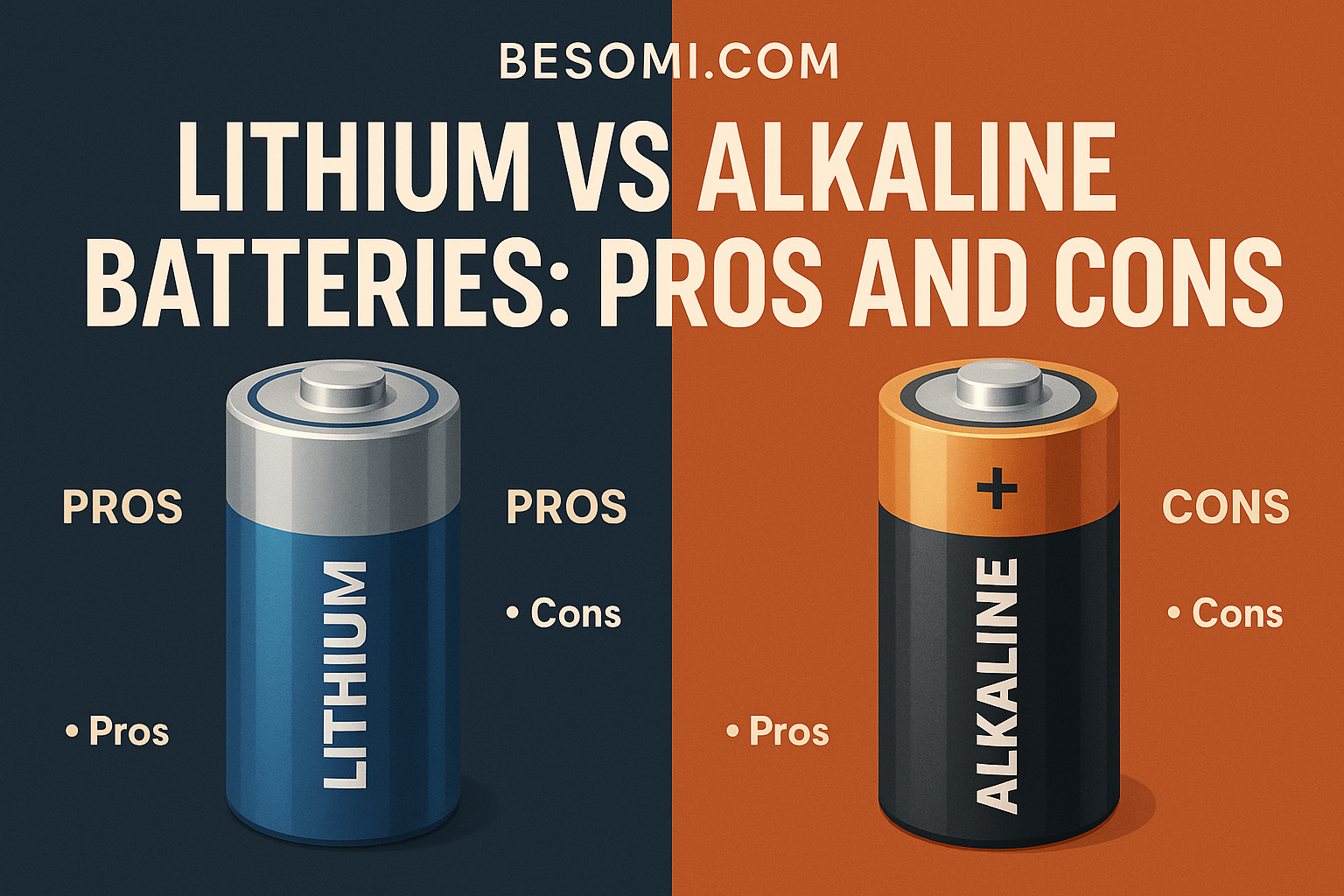
Lithium vs Alkaline Batteries: Pros and Cons
When it comes to choosing the right battery type to power your everyday device, the choices are countless. Yet, the two most common ones are lithium and alkaline batteries. Each possesses its own set of characteristics, making them suitable for different applications and user preferences. Understanding the differences between these two common battery chemistries is crucial for making an informed decision that best meets the power requirements of your specific devices.
In this guide, we will compare lithium vs. alkaline Batteries to understand the differences between them.
Lithium Batteries Definition
A lithium battery (more commonly, a lithium-ion battery or Li-ion battery) is a type of rechargeable battery that primarily uses lithium ions as the key component in its electrochemical reactions to store and release energy.
Lithium Batteries Advantages
- Rechargeable: Unlike disposable "lithium metal" batteries, lithium-ion batteries are designed to be repeatedly charged and discharged.
- Lithium ions: During charging and discharging, lithium ions move back and forth between the battery's positive electrode (cathode) and negative electrode (anode) through an electrolyte. This movement generates the electrical current.
- High energy density: Lithium-ion batteries are known for their ability to store a significant amount of energy in a relatively small and lightweight package, making them ideal for portable electronic devices and electric vehicles.
- Components: A typical lithium-ion battery consists of a cathode (usually a lithium metal oxide), an anode (often graphite), a separator to prevent short circuits, and an electrolyte (a lithium salt in an organic solvent).
- Lightweight: They are lightweight and ideal for portable devices such as smartphones, laptops, and electric vehicles.
Lithium Batteries Disadvantages
- Cost: Lithium-ion batteries are generally more expensive to produce than other battery chemistries, like alkaline or lead-acid batteries. This higher upfront cost can be a barrier for certain applications.
- Safety concerns: This is one of the most critical disadvantages. Under certain conditions, such as overcharging, physical damage, and extreme temperature, lithium-ion batteries can experience "thermal runaway." This is a rapid, uncontrolled rise in temperature that can lead to fire or even explosion.
- Limited lifespan: While they offer many charge cycles, lithium-ion batteries degrade over time, even when not in use. Their capacity to hold a charge gradually diminishes, leading to a shorter overall lifespan compared to some other technologies.
- Environmental impact of raw material extraction: The mining process of raw materials for lithium batteries, such as lithium, cobalt, and nickel, can have major environmental impact.
Alkaline Batteries Definition
On the other hand, an alkaline battery is a type of primary (non-rechargeable, or disposable) battery that generates electrical energy through a chemical reaction between zinc metal (the anode, or negative electrode) and manganese dioxide (the cathode, or positive electrode).
Alkaline Batteries Advantages
- High Energy Density: They can store a significant amount of energy relative to their size and weight, especially compared to older zinc-carbon batteries. This allows devices to operate for a relatively long time.
- Long Shelf Life: Alkaline batteries have a low self-discharge rate, meaning they retain their charge for a long time (typically 5-10 years) when stored at room temperature. This makes them good for devices that aren't used frequently or for emergency kits.
- Stable Voltage Output: While their voltage does gradually decline as they discharge (a sloping discharge curve), they generally provide a relatively stable voltage output for a significant portion of their life, which is suitable for many electronic devices.
- Wide Temperature Range: They can operate effectively across a reasonable temperature range, typically from around -18°C to 55°C, though performance can decrease at extreme ends of this range.
- Safety: Normally, alkaline batteries are safe and stable under normal operating conditions.
Alkaline Batteries Disatvantages
- Single use: This is their primary drawback. Once the chemical reaction has run its course and the reactants are depleted, the battery is dead and must be disposed of. This generates waste and requires frequent replacement for high-drain devices.
- Leakage risk: As alkaline batteries discharge, especially when fully depleted or left in a device for a very long time, the internal pressure can build up. This can cause the battery casing to swell and potentially leak the corrosive potassium hydroxide electrolyte.
- Weight: Compared to lithium-ion batteries, alkaline batteries are generally heavier for a given energy capacity, which can be a consideration for portable or weight-sensitive applications.
- Environmental impact: Due to their single-use nature, a vast number of alkaline batteries are manufactured, used, and then discarded globally, contributing significantly to landfill waste.
FAQs
- What is the main difference between lithium and alkaline batteries?
Lithium batteries (specifically lithium-ion) are rechargeable and ideal for high-drain devices, while alkaline batteries are single-use (disposable) and better suited for low-drain devices.
- What are the key safety concerns with lithium batteries?
Lithium-ion batteries can experience "thermal runaway" due to damage or overcharging, leading to rapid heating, fire, or even explosion.
- Why do alkaline batteries sometimes leak?
Alkaline batteries can leak corrosive electrolyte when fully discharged or left in devices for extended periods, as internal pressure builds up.
- Are lithium batteries more environmentally friendly than alkaline batteries?
Both have environmental impacts. Lithium batteries have concerns regarding raw material extraction, but alkaline batteries contribute significantly to landfill waste due to their single-use nature.

